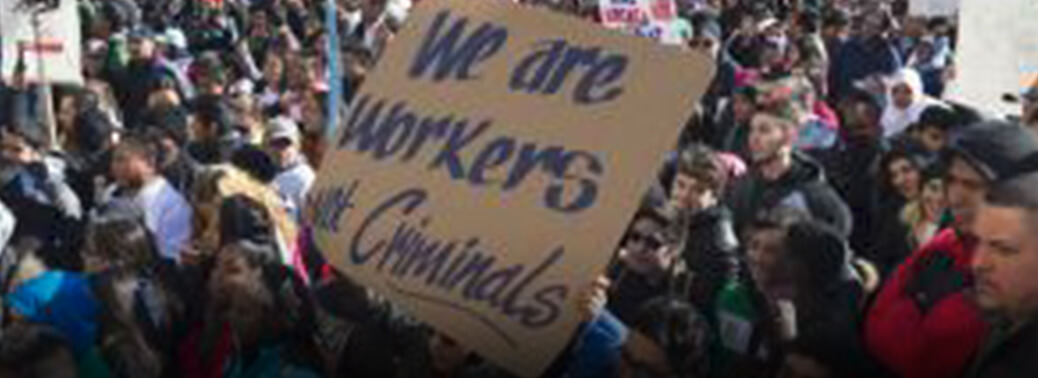WORKERS AND REFUGEES ARE NOT CRIMINALS
22, Apr 2019

Prelims level : Polity & Governance
Mains level : GS-II Governance, Constitution, Polity, Social Justice and International relations
Why in News?
- Global political action is required to reinforce the legitimate identity of a worker
Details:
- The Mexican border was closed for hours on November 25, 2018 at the San Ysidro Port of Entry to the U.S., after a group of migrants, including children and women, in Tijuana reportedly stormed the area.
- This prompted the U.S. Border Patrol to fire tear gas at the group. Among the hand-made placards carried by the migrants was this one: “We are international workers. We are not criminals.
Xenographic Assertion
- It was a revealing placard, and one that commented on a major change in global economic and political thinking: since the 1990s, not just international but even interregional workers have slowly been pushed into the rubric of ‘criminals’.
- U.S. President Donald Trump is a prime example of this: his victory
- was largely founded on his ability to depict international workers, particularly those crossing the U.S.-Mexico border, as ‘criminals’.
- With elections coming up in the U.S. once again, he has returned, with renewed vigour, to this discourse. This tendency is present, though in less obvious versions, in almost all developed and developing countries, including the social welfare democracies of Europe.
- It is also present within nations, as we in India witnessed in the recent ‘Gujarati’ backlash against workers from Uttar Pradesh and Bihar. Now, it is true that ‘foreigners’ have been looked at with suspicion by some ‘natives’ in the past too, but what we are talking about is a bit different.This is because no one really denies that most of these people who want to enter a country do so in order to find work. Also, all but the most rabid of hate-mongers are fully aware that, say, most Biharis in Gujarat or Mexicans in the U.S. are law-abiding and often needy workers. And yet politicians can garner extra votes by implicitly or explicitly equating international/interregional ‘workers’ with ‘criminals’, and states can openly devise blatantly differential treatment for them — as the children ripped away from their parents and the workers tear-gassed at the U.S. border can testify.
- Most immigrants crossing a border are law-abiding and industrious workers, not ‘criminals’
- — this remains the case today, as it was in the past.
- The answer lies in the nature of capitalism, which no longer needs workers as much as it did in the past. Financial speculation has increasingly dwarfed international trade from the 1990s onwards
- A world dominated by financial speculation does not need workers in two ways: financial speculators are not workers, no matter what they think of their ‘work’, and financial speculation does not depend on the production of workers.
- Capital transactions are no longer tied predominantly to industry, productivity or trade of goods — and hence, to workers.
Post humanism
- In academia, for instance, there is the trend to talk about ‘post-humanism’.
- Post-humanism has a respectable heritage. In fields like animal studies, it is often meant to suggest a world in which human beings do not occupy the centre.
- This is an interesting and necessary concept, for the earth has suffered much from our narcissism as a species and our inability to think of other animals as having biological rights too. But ‘post-humanism’ is mostly used in other ways: it is used to suggest a world after human beings, a world run by artificial intelligence
- a world of financial speculation leads to a ‘post-human’ world run by artificial intelligence. Once workers become redundant and numbers are sufficient, then, inevitably, one can think complacently of replacing human intelligence with artificial intelligence.
- In some ways, of course, much of financial speculation depends on exactly this: a kind of artificial intelligence, not human labour. The reduction of workers to criminals is part of this change, and interestingly the solution is not just to insist on the right to work locally or even nationally.
- The insistence has to be ‘universal’ and global. Global political action is needed to ensure international working rights, linked to human status and not the caprice of state or capital. The right to work has become a selective right; today it is controlled by governments in tandem with corporations. Soon it might well become the monopoly of corporations. It is basically being used to criminalise those workers who are not allowed — by nation-states or neoliberal capitalism or both — the legitimate identity of a worker.
- And as this is a shrinking identity — there are fewer and fewer active workers under the impact of rampant financial speculation — it simply adds to the official metamorphosis of more workers into ‘criminals’.






